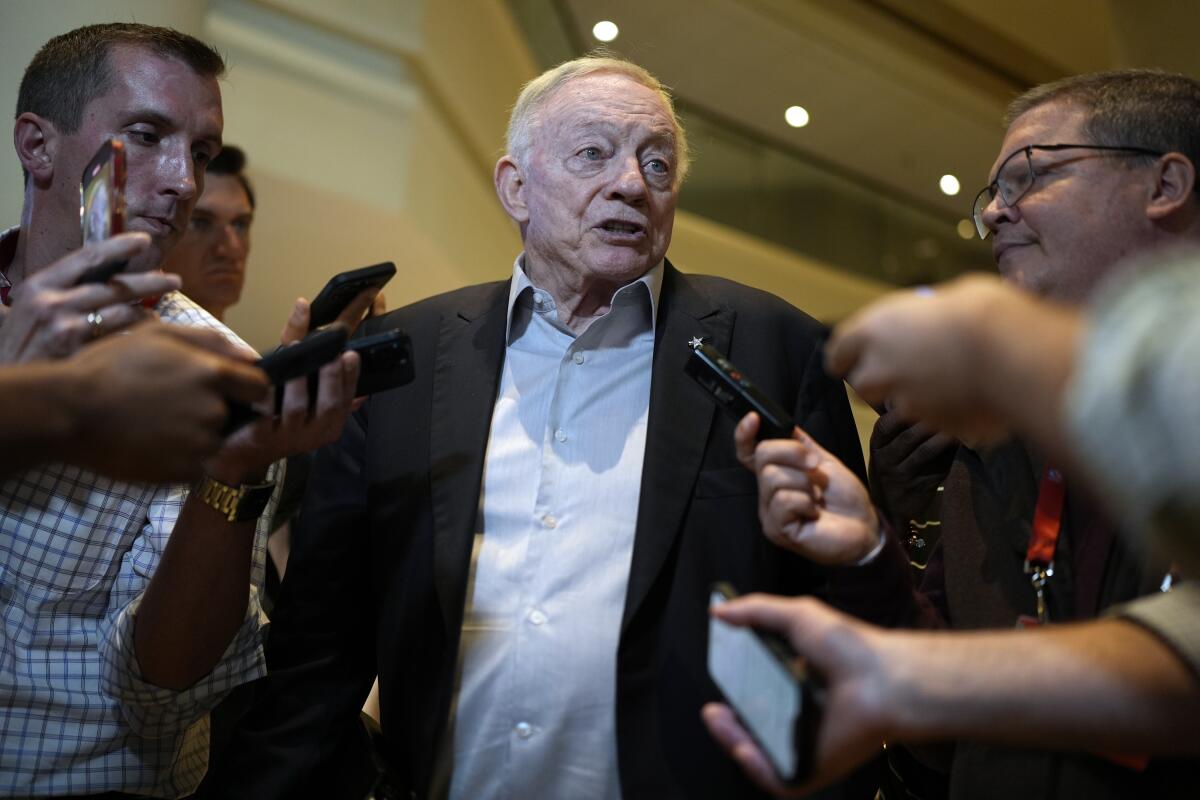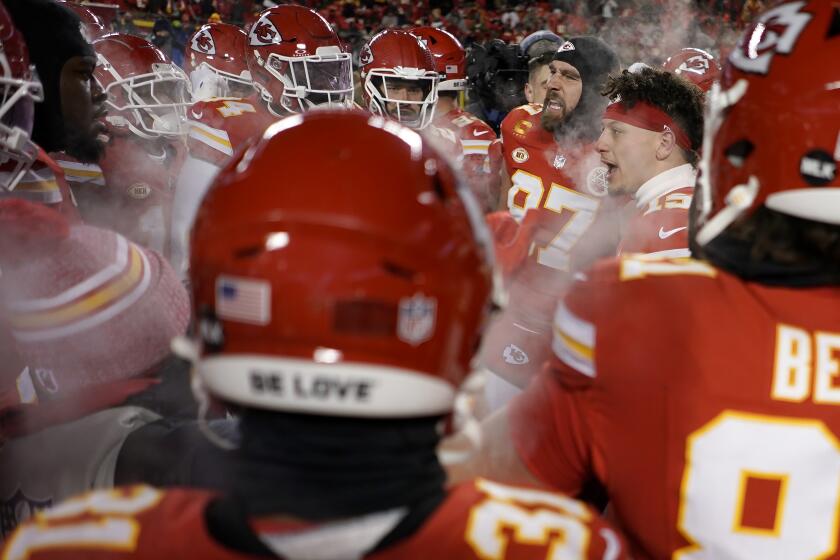Plaintiffs seek to show ‘dark side of NFL’ in $21-billion Sunday Ticket lawsuit

- Share via
Did the NFL conspire to put the squeeze on its biggest fans, driving up the price of DirecTV’s Sunday Ticket package so subscribers would be forced to pay top dollar to watch the full array of Sunday games?
That’s what the plaintiffs contend in a class-action lawsuit that got underway Thursday in a federal courtroom in Los Angeles, the culmination of a nine-year legal odyssey. The case began in 2015 when a San Francisco pub called the Mucky Duck filed a complaint about how the league handles its out-of-market broadcasts.
The allegation is the NFL colluded with network partners CBS and Fox, along with DirecTV, and controlled the pricing of Sunday Ticket to ensure it remained expensive, thereby violating antitrust law.
MLB should be paying close attention to a trial in which the NFL is the primary defendant against allegations that its Sunday Ticket package violates antitrust law.
The class action was filed on behalf of more than 2.4 million residential subscribers and more than 48,000 restaurants, bars and other commercial establishments that show the games.
Among those expected to testify either in person or virtually are NFL commissioner Roger Goodell, Dallas Cowboys owner Jerry Jones and New England Patriots owner Robert Kraft.
A fortune is at stake. The plaintiffs are estimating $7 billion in damages for the period between 2011 and 2022, and those are tripled in antitrust cases. That $21 billion is enough to buy an entire four-team division.
In her opening statement Thursday, Amanda Bonn, attorney for the plaintiffs, said the case wasn’t an attack on the right of businesses to make money but instead “the dark side of the NFL, what happens behind the shield.”
The NFL argues it didn’t control pricing and DirecTV did, often giving away the product for free to attract subscribers. The league contends it has the most fan-friendly media model in sports, with all local games available on over-the-air TV.
If you are a Rams or Chargers fan living in the Los Angeles market, you can see all of those games for free — even those that are only available in other parts of the country on streaming services.

The Sunday Ticket package, now sold through YouTube TV, allows subscribers access to the broadcasts of all out-of-market Sunday games, which air on CBS and Fox. They are not special broadcasts but identical to what people are seeing in those various home markets. By the league’s estimate, a mere 3% of fans subscribe to Sunday Ticket, which this season costs $349 absent any discounts or promotions.
“It’s a valuable, premium product, and the prices were reasonable,” Beth Wilkinson, representing the NFL, said in her opening statement. “Fans don’t have to buy Sunday Ticket. … The league wants as many people as possible to watch the free broadcasts.”
Wilkinson said that after promotions and giveaways, the average price of Sunday Ticket during the period in question was $102.70 per season.
The plaintiffs say that instead of making fans pay for access to every game, the league should have provided a la carte options so subscribers could zero in on a specific team or game. For instance, one of the two residential plaintiffs lives in the Bay Area and only wanted to watch his beloved New Orleans Saints. He dropped Sunday Ticket because paying for every game was too expensive.
There is no denying the popularity of the NFL on TV. Of the top 100 most-watched shows last year, 93 of them were NFL games.
While building the 2024-25 NFL schedule, the league pushed for strong storylines and to deliver intriguing matchups to every TV network and streamer.
In 1961, Congress passed the Sports Broadcasting Act, which provided a limited antitrust exemption to professional football, basketball, baseball and hockey leagues, allowing the individual teams in those leagues to pool together to negotiate national TV contracts. The caveat: Those games had to be shown on over-the-air TV. That was long before the concept of premium cable channels and certainly streaming broadcasts.
Things are different north of the border. In Canada, there are multiple distributors of Sunday Ticket and the same product is available for $149 per season. The plaintiffs say the NFL rejected the idea of ESPN taking over the package and selling it to subscribers for $70, or having a system akin to college football in which each of the 32 NFL teams negotiates its own broadcasting deal.
The NFL contends that idea, every team cutting its own deal, would be chaotic. Imagine what the Green Bay Packers might command, for instance, compared with the Jacksonville Jaguars. In the league’s view, that would erode the system of revenue sharing and competitive balance.
More to Read
Go beyond the scoreboard
Get the latest on L.A.'s teams in the daily Sports Report newsletter.
You may occasionally receive promotional content from the Los Angeles Times.













